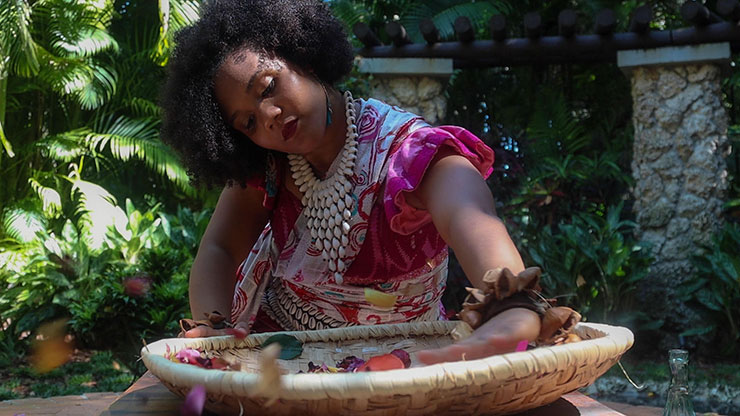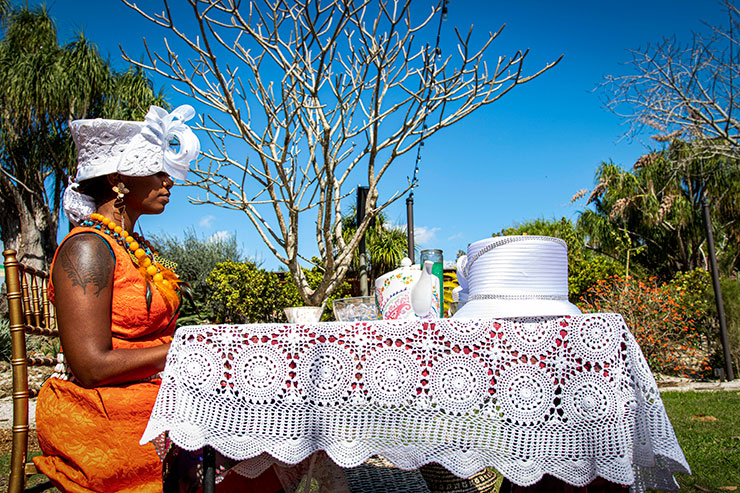
Choreographer Michelle Grant-Murray's "Rosewater" is the first of six new performance pieces addressing climate change and sustainability produced by Live Arts Miami.
With movement inspired by contemporary and traditional modern dance infused with elements of African dance to connect us to the cosmos, choreographer Michelle Grant-Murray kicks off LALA’s Performance Series, the first of six new performance pieces addressing climate change and sustainability produced by Live Arts Miami.
Her site-specific dance performance at Pinecrest Gardens on Friday and Saturday is titled, “RoseWater - A Dance Ritual for Hope and Ancestral Healing in the Wake of Environmental Racism.”
“We commission original works by local artists sharing their personal perspectives of climate change as seen through the lens of Miami,” says Kathryn Garcia, executive director of Live Arts Miami.
Grant-Murray is also artistic director of Olujimi Dance Theatre and Jubilation Dance Ensemble as well as associate professor of dance at Miami Dade College and one of six artists in residence at Live Arts Miami’s 2020/2021 Live Arts Lab Alliance Artist (LALA).
“Michelle created a moving and profound dance piece by using her time during the COVID-19 quarantine as a period of introspection and exploration into how healing processes in her family have been passed down through the generations,” Garcia says.

Michelle Grant-Murray presents her site-specific dance performance at Pinecrest Gardens this weekend.
“It's a gift for the community to hear her voice and story,” she says.
Grant-Murray’s story begins in Texas where she and her extended family lived on a farm and off the land. Her memories of that time, until the age of 12 when she moved to Florida, remain indelible, especially those of her grandmother bathing her in rosewater.
For Grant-Murray, rosewater is symbolic of sustaining and protecting family, cultural significance and ancestral memories.
“Bathing me in rosewater was a way for my grandmother, Elma Julius Newton Henry, to transmit love,” remembers Grant-Murray. “The rosewater smelled so good, made my skin beautiful and made me feel protected at the same time.”
During the pandemic, Grant-Murray experimented to recreate her grandmother’s recipe.
“The process of creating rosewater in the middle of a pandemic has been challenging and beautiful at the same time,” she says.
In addition to concerns about COVID-19, Grant-Murray couldn’t escape the social unrest brought about by the killing of George Floyd, Breonna Taylor and others and the breaching of the nation’s Capitol by insurrectionists, which triggered memories of how she and other black families coped historically in trying times.
The result of her ruminations culminated in a performance piece juxtaposing sobering revelation with hopeful inquiry, calling for transformational change and acknowledging the multigenerational legacy of healing and restoration passed down through ancestral lines in African-American families.
Through movement and memory the dance ritual explores what we leave behind, what’s passed between the generations, what sustains us and how memories and traditions build community.
“How did we get to this point,” she wonders. “How do we (black families) sustain ourselves in times of anguish? How do we get to the other side?”
All the turmoil and questions it provoked resonated with Grant-Murray.
“Talk of climate change can be a lot of doom and gloom,” says Garcia, “but Michelle takes a look at social issues as a way of initiating conversation. Her focus is on healing, resilience and restoration and offers an opportunity to listen to voices which may not have been as valued in the past.”
Charged with exploring the topic of climate change, Grant-Murray realized that social justice issues and environmental issues are inter-related and culminate in what she calls “environmental racism.”
“We’re looking at land gentrification, carbon footprint, water ethics; we’re examining those things and how they intersect with environmental racism,” she says. “What’s the root and foundation of it? That’s the conversation I would like to have with the audience and the community.”
“How do we move on – politically, spiritually, socially and physically,” she asks.
The outdoor performance transforms Buckminster Fuller’s Banyan Bowl at Pinecrest Gardens into a space of inspired ritual movement, critical inquiry and embodied memories, unfolding throughout the grounds and accompanied by original videos.
Both excited and nervous about the upcoming live performance, (an uncertainty a month ago) Grant-Murray says, “It’s time for a reckoning. We need to respect the earth, respect our fellow humans, find healing and get on the road to restoration.”
2021 LALA Performance Series – Michelle Grant-Murray’s RoseWater.
Friday and Saturday, April 23 and 24, at 7:30 p.m.
Pinecrest Gardens, 11000 SW 57 Ave, Pinecrest.
Tickets free and open to the community.
RSVP at www.liveartsmiami.org.
The show will be presented live to a limited audience with COVID-19 safety protocols in place. All guests must register in advance and show their e-ticket on their mobile device at the door. All are required to adhere to social distancing guidelines and wear the appropriate facial coverings correctly throughout the event, except when eating or drinking.




